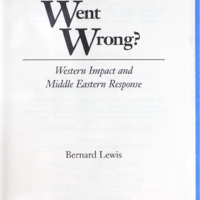-
Title
-
What went wrong? : Western impact and Middle Eastern response
-
Description
-
For many centuries, the world of Islam was in the forefront of human achievement - the foremost military and economic power in the world, the leader in the arts and sciences of civilization. Christian Europe, a remote land beyond its northwestern frontier, was seen as an outer darkness of barbarism and unbelief from which there was nothing to learn or to fear. And then everything changed, as the previously despised West won victory after victory, first on the battlefield and in the marketplace, then in almost every aspect of public and even private life. "In this volume, Bernard Lewis examines the anguished reaction of the Islamic world as it tried to understand why things had changed, how they had been overtaken, overshadowed, and to an increasing extent dominated by the West. Lewis provides a fascinating portrait of a culture in turmoil. He shows how the Middle East turned its attention to understanding European weaponry and military tactics, commerce and industry, government and diplomacy, education and culture. He describes how some Middle Easterners fastened blame on a series of scapegoats, both external and internal, while others asked, not "who did this to us?" but rather "where did we go wrong?" and, as a natural consequence, "how do we put it right?" Lewis highlights the striking differences between the Western and Middle Eastern cultures from the eighteenth to the twentieth centuries with thought-provoking comparisons of such things as Christianity and Islam, music and the arts, the position of women, secularism and the civil society, the clock and the calendar."--BOOK JACKET.
-
Identifier
-
996530
-
195144201
-
Creator
-
Lewis, Bernard
-
Source
-
Brian Lamb Booknotes Collection
-
Gift of Brian Lamb, 2011.
-
Catalog record
-
Language
-
eng
-
Date
-
2002
-
Program air date: December 30, 2001
-
Publisher
-
Oxford University Press
-
George Mason University. Libraries. Special Collections & Archives
-
Text
-
Transcript of Annotations
Notes from front endpapers: "Persia: comes from Pars, a south western province of Iran. - Arabs have no "p". - Fars - Farsi. - For centuries Islam represented most powerful military in the world. - 14 centuries of Islamic history. - At present time secularism is in a bad way in the Middle East. - 1. Status of women: biggest difference between the two civilizations. 2. Science. 3. Music. - Unwelcome import from the New World : Syphilis. - Middle Easterners needed study in languages." -- Annotations by Brian Lamb in the margins and underlining of pertinent phrases throughout the book. - Examples: p. 109: "For more than a thousand years, Islam provided the only universally acceptable set of rules and principles for the regulation of public and social life." - p. 112: "Certainly in Iran, organized religion has returned to something like the status that it enjoyed in the medieval world, both Christian and Islamic." - p. 114: "There is nothing in Islamic history to compare with the emancipation, acceptance, and integration of other-believers and non-believers in the West." - p. 159: "If the peoples of the Middle East continue on their present path, the suicide bomber may become a metaphor for the whole region, and there will be no escape from a downward spiral of hate and spite."
-
Relation
-
Original Booknotes interview
-
Rights
-
This work may be protected by copyright laws and is provided for educational and research purposes only. Any infringing use may be subject to disciplinary action and/or civil or criminal liability as provided by law. If you believe that you are the rights-holder and object to Mason’s use of this image, please contact speccoll@gmu.edu.
 996530.pdf
996530.pdf